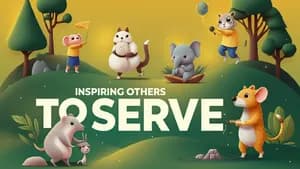Breaking Barriers Through Service: Building Unity Through Shared Volunteering
Have you ever thought about how volunteering can bring people together from different backgrounds? Imagine a world where differences are celebrated, and understanding flourishes through shared experiences. That's the power of service! In this article, we'll explore how volunteering can bridge cultural gaps and build unity, fostering empathy and understanding amongst individuals from diverse backgrounds.
The Power of Shared Purpose
Volunteering is a powerful tool for bringing people together because it transcends cultural boundaries. When you join forces with others to support a cause you care about, you create a shared purpose that unites you beyond differences in language, ethnicity, or beliefs. Imagine a group of students from different schools coming together to organize a food drive for a local shelter. They might have different perspectives and experiences, but their shared goal of helping those in need creates a strong bond. This shared purpose becomes a common ground where individuals from different walks of life can connect and contribute to a meaningful cause, fostering a sense of belonging and unity.
Stepping Outside Your Comfort Zone: Embracing Diversity
Volunteering provides an opportunity to step outside your comfort zone and interact with people from different backgrounds. You'll learn about different cultures, perspectives, and ways of life. Let's say you volunteer at a community garden with a diverse group of individuals. You might learn about different gardening techniques, traditional recipes, or even new languages. These experiences can help you develop empathy, understanding, and appreciation for the richness of diversity.
Learning Through Action: Building Empathy Through Shared Experiences
Volunteering allows you to experience the world from a different perspective. It's not just about helping others; it's about learning from them. When you volunteer at a homeless shelter, you might gain a deeper understanding of the challenges faced by those experiencing homelessness. You might learn about the systemic issues that contribute to homelessness or the resilience and strength of individuals overcoming adversity. These firsthand experiences foster empathy and a sense of shared humanity, breaking down stereotypes and misconceptions that often divide us.
Creating a Ripple Effect: The Impact of Shared Service
Volunteering is more than a one-time act of kindness; it's a ripple effect that extends far beyond the immediate service. When you volunteer, you're not only helping the organization or individuals you're serving; you're also inspiring others to get involved. Think about a group of students who organize a fundraiser for a local charity. Their efforts inspire others in their community to donate or volunteer. This ripple effect creates a snowball effect, bringing more people together to support causes they care about and build a more united community.
Conclusion: Embracing Unity Through Service
In a world increasingly divided by differences, volunteering offers a powerful antidote. By embracing shared service, we can bridge cultural gaps, build empathy, and foster unity. Volunteering allows us to connect with others on a human level, recognizing our shared values and aspirations. So, whether you're a student looking for meaningful experiences or a parent seeking ways to instill values of compassion in your child, consider the power of volunteering to break down barriers and build a more united world.
Remember, every act of service, no matter how small, can have a profound impact. Start by identifying a cause you care about, finding a local organization that aligns with your interests, and taking that first step towards making a difference. You might be surprised by the transformative power of service in your life and in the lives of those around you.

